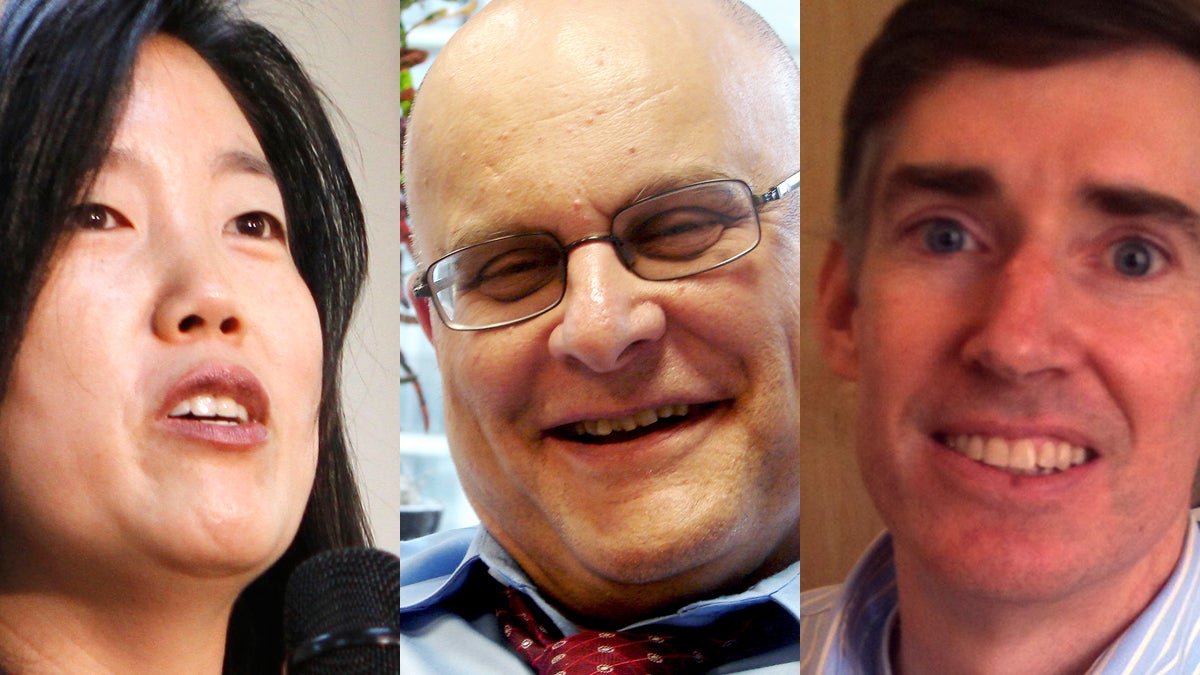Who are the educational reformers and why should anyone listen to them?

From left: Michelle Rhee (AP Photo, file), Jeremy Nowak, Mark Gleason (NewsWorks, file)
A cartoon is making the rounds on Facebook. An adult stands holding a blank slate and asking the question, “And how much experience do educational reformers have?” The scary answer is little to none.
Let’s take look at some of the people who would have the public believe that they know what is best for our children.
First, there is the darling of the “reformees,” Michelle Rhee, whose teaching credentials included just five weeks of training with Teach for America. Michelle Rhee went from putting tape on the mouths of her eight-year-old students to keep them quiet to becoming the chancellor of public schools in Washington, D.C. With just three years of teaching under her belt, Rhee argued that poverty was no excuse for educational failure, even though experienced pediatric researchers like Philadelphia’s own Dr. Hallam Hurt have found the exact opposite to be true. Rhee’s precipitous rise to the top gave credence to all sorts of misguided beliefs about education that have influenced many school districts across the country, including Philadelphia.
Then there was Jeremy Nowak, a businessman and former head of the William Penn Foundation, who introduced the Boston Consulting Group, a management-consulting firm, to the SRC, ostensibly to design a strategic plan for the schools. Nowak and the BCG formulated a “plan” that recommended closing 50 Philadelphia schools without ever speaking to even one student, teacher, parent or community member. Although Nowak was chosen for his position because of his “ability to bring everyone to focus on a set of issues,” he admitted his lack of engagement with key community members during a meeting last fall at Enon Tabernacle Church. The Boston Consulting Group? According to its own definition, it is “the world’s leading advisor on business strategies.” BCG is not an expert in the field of education.
And now there is Mark Gleason, the executive director of the Philadelphia School Partnership. PSP was founded to “accelerate the pace of education reform in the City of Philadelphia.” Although Gleason is knee deep in the Philadelphia schools to the point that he is lobbying to outsource the public enrollment process to a private company, he is a former journalist whose only educational experience was as the president of the school board of the South Orange-Maplewood School District near Newark, New Jersey, an area that does not have the complex social conditions which have dogged the School District of Philadelphia. In spite of the “reform” language on the PSP website, Gleason, if you will recall, argued against the governor’s releasing of the $45 million dollars of federal money to help the school district. He was, apparently, quite content to have Philadelphia’s public school children languish in over-crowded classrooms, trying to learn in unsafe conditions without counselors, vice principals, and nurses.
The Philadelphia School Partnership has raised tens of millions of dollars and awarded money to schools that he and other non-educators consider “high-quality” alternatives to underfunded Philadelphia public schools. Aside from the fact that business people and journalists are making decisions about the survival of community schools, PSP awards money to Catholic schools, none of which publishes their test scores, and to charter schools, who do not have the same level of ESL or special education students that district schools have.
Running schools like a business causes more harm
Combine people like Rhee, Nowak and Gleason, organizations like PSP and the Boston Consulting Group, and the glaring lack of educators on the School Reform Commission, and it is no wonder that our children have been subjected to a doomsday budget that places their education — as well as their health and welfare — in jeopardy.
So, why does anyone follow the advice of people like Mark Gleason? Why would Philadelphia Magazine sit him at the same table with Helen Gym of Parents United, David Hardy of Boys’ Latin, and Simon Hauger, a teacher at The Philadelphia Sustainability Workshop to discuss whether the public schools are worth saving? Why would anyone allow a journalist with little educational experience to testify in City Council to promote a sea change in educational practice? Then, why would our nation’s capital promote a teacher with a mere three years’ experience to be the chancellor of their schools?
The “reformee” answer to the complex problem of education is simple; design a “plan,” enter the data, get the right people to push the right buttons, run schools like a business which slashes out anything that doesn’t fit into the plan, and voila, out comes a country of Stepford children who can pass the standardized tests. It’s so simple, anyone — even a neophyte teacher and a journalist — can do it.
This is the PR being fed by educational entrepreneurs like Mark Gleason to mayors and governors who are looking for a cheap and easy way to educate the nation’s children.
We who work with children know that children have been placed at serious risk by such simple-minded plans and ideas. A school is not a widget factory, a child is not a “seat,” and passing an endless series of standardized tests does not necessarily mean that a person is educated.
Governors, mayors, and superintendents who have placed the welfare of vulnerable children in the hands of the business community get the result we have right now: underfunded, dangerously understaffed schools, and a milieu that is not conducive to learning. Our children deserve better.
—
Eileen DiFranco is a writer, community volunteer, and a registered public school nurse.
WHYY is your source for fact-based, in-depth journalism and information. As a nonprofit organization, we rely on financial support from readers like you. Please give today.

